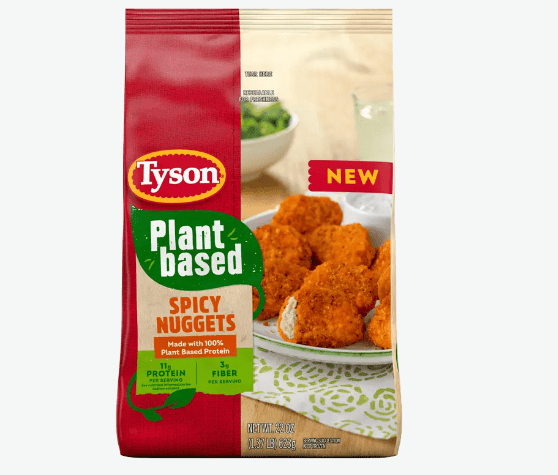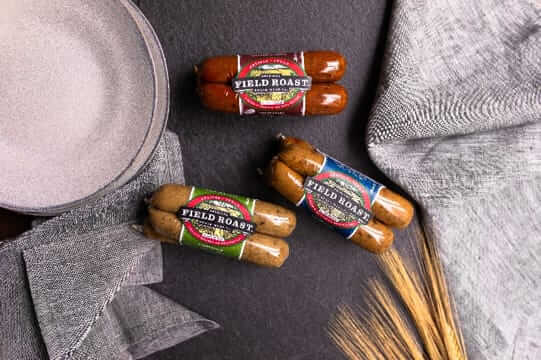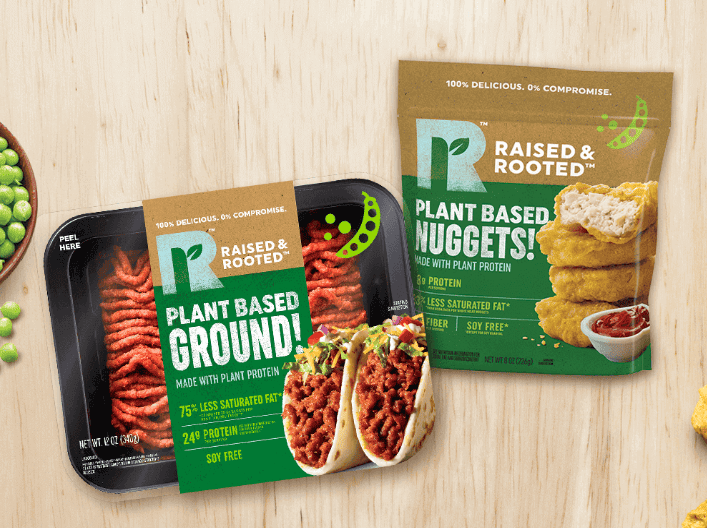Following the first part as published yesterday, this is part two of a series on meat companies that entered the plant-based category, some that tried and failed, with the products no longer listed, and others that succeeded and are still on the market today.
This second installment focuses on the USA and Canada, where smaller plant-based startups have struggled over the course of 2023 with many having to sadly close doors, including Hooray Foods, Nowadays, and The Very Good Food Co., and many others reducing operations and laying off staff to try and achieve profitability.
Does the dominance of large multinationals hinder the success of startups in the space? Or does their presence help to bring awareness of plant-based and bring vegan products into the mainstream, thus lowering prices? The answer is likely a complex combination of both.
As Kellogg Chief Executive Steven Cahillane said in an earnings call earlier this year, “We see an imminent shakeout coming. It’s happening already. And there’ll be a couple of players left standing.” As an objective platform, it is not our remit to opine on the shakeout, though we of course support all in the plant-based space and hope for their survival. Here we take a look at US and Canada-based meat companies that entered the space.

Tyson Foods, USA
Tyson Foods is the second-largest processor and marketer of chicken, beef, and pork in the world, and the largest poultry producer in the US, with a market share of about 25%. The company has 123 food processing plants and made headlines recently as the Department of Labor is currently investigating reports of child labor violations in the company’s Virginia facilities. Tyson also recently reduced US chicken slaughter capacity by 10% and announced plans to close four facilities due to a drop in sales.
The company first entered the plant protein market through a series of investments into Beyond Meat, along with cultivated meat companies Memphis Meats and Future Meat Technologies. But in 2019, Tyson exited its investment in Beyond Meat prior to the transition from private to public offering.
In the same year, Tyson launched its own brand, Raised and Rooted, with vegetarian nuggets and hybrid beef/pea protein burgers. The burger was discontinued in 2020, and the egg whites were removed from its nuggets to make them 100% plant-based. The brand continued to release new products, including new plant-based patties, ground, and sausages in 2021, and recently launched new plant-based nuggets earlier this year. Raised and Rooted now has 10 plant-based products total, and although they aren’t prominent the products are available at various retailers around the US.

Also, in 2021, Tyson expanded its Jimmy Dean brand product line with the addition of plant-based breakfast patties, which is slightly misleading as they do contain egg whites, and the company launched a new meat alternatives brand, First Pride, in Malaysia.
Maple Leaf Foods, Canada
Maple Leaf Foods is the largest food producer in Canada, producing and processing meat, pork, and poultry products, along with animal feed, vegetables, fruits, and pharmaceutical products, which are sold to customers worldwide.
In 2019, the company formed a subsidiary called Greenleaf Foods to serve as the umbrella for its plant-based businesses Lightlife Foods and Field Roast Grain Meat Co. Greenleaf announced the construction of North America’s largest plant-based protein facility that same year and both Lightlife and Field Roast have continued to be successful ever since, launching new product lines and signing deals with retailers like Whole Foods Market.

Last year, Maple Leaf Foods partnered with Better Meat Co. to develop mycoprotein meat alternatives and also made a substantial investment in cultivated meat. Most recently, Maple Leaf Foods reduced its Greenleaf division by 25% due to a decrease in demand and posted a quarterly loss in Q1 of this year.
Hormel, USA
Hormel is an American food processing company that has been packaging and selling meat and poultry since 1891. The company is most well-known for its signature product, Spam, processed canned pork, but it has branched into many frozen, refrigerated, and self-stable product categories, including microwaveable meals, snacks, desserts, drink mixes, and more.
In 2019, at the apex of Vegan 2.0, CEO Jim Snee remarked that plant-based foods were to him a “shiny new toy” during a conference, then went on the next year to launch Happy Little Plants, a line of meat alternatives made from soy protein. Its initial offering was plant-based ground meat, which was sold at Hy-Vee, followed by pepperoni-style topping, which was available solely for foodservice. Both of these offerings have since been discontinued. Hormel now only offers its vegan chorizo-style crumbles through its foodservice website.

Beyond its own products, Hormel also partnered with The Better Meat Co. in 2021 to develop plant-based alt protein made from mycoprotein. While the products are not yet available to purchase, The Better Meat Co. is in the process of obtaining further patents for its technology and has hosted an event to showcase the various applications of its mycoprotein.
Perdue, USA
Perdue Farms is a large-scale pork, chicken, and turkey processing company in the US. Founded in 1920, the company has 36 production facilities in the US and exports its meat products to countries across Europe, the Mediterranean, Asia, South America, and the Caribbean.

In 2018, Perdue Farms stated its intention to invest in plant-based alternatives, but to date, no reported investments have been made. In 2019, the company launched hybrid products containing a blend of chicken with vegetables, which were developed as part of a partnership with The Better Meat Co. The products are currently still available and include Chicken Breast and Vegetable Dino Nuggets, and Chicken Plus Snackers.
In the next installments we take a look at the European markets.




